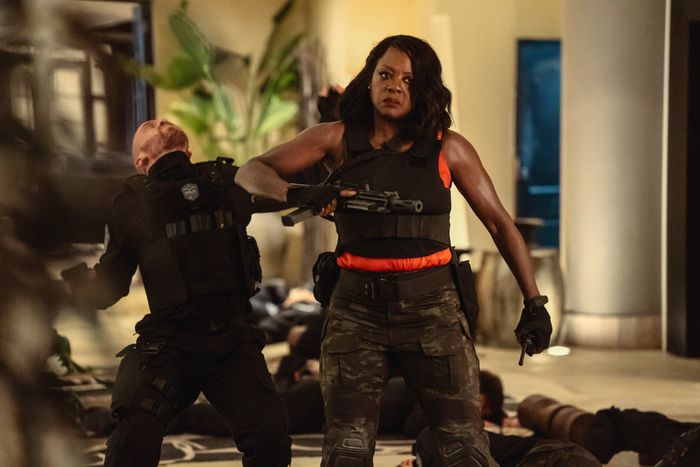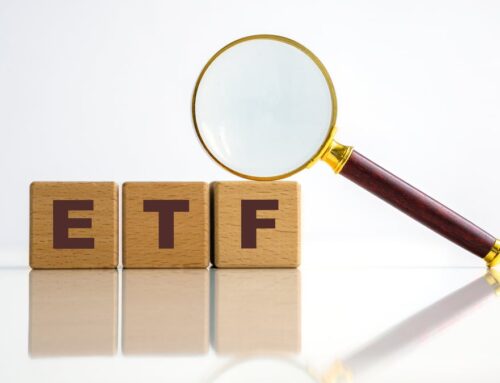What Was America?
April 11, 2025
Review: ‘G20’ Is the Last Gasp of a Dying America
Things you buy through our links may earn Vox Media a commission.
2:00 P.M.

Photo: Ilze Kitshoff/Amazon Prime Video/Everett Collection
G20 is a thriller in which a group of terrorists holds several heads of state hostage at the South African hotel where they’ve gathered for the annual Group of 20 summit, using them as leverage to destabilize the world economy — until the American president, played by Viola Davis, saves the day through a combination of dedication and bloodshed. The irony is not the sort that’s possible to miss. Leaving this week’s New York premiere for the film, which sprawled over several theaters on a bought-out floor of the Regal in Times Square, I was greeted by a barrage of news stories about the markets being thrown into chaos by our country’s real-life commander-in-chief, Donald Trump, who has been turning tariffs on and off like Stephen Stucker with the runway lights in Airplane! The primary bad guy of G20 is a private contractor, a disgruntled Australian ex-soldier who crafts an elaborate plan involving deep fakes of world leaders conspiring to create a global currency that will allow them to remain in power forever, creating a panic that drives up his own extensive bitcoin holdings. In comparison, our present situation, as disastrously messy as it is, has a narrative tidiness. Why bother with such a preposterous setup when you can have the guy in charge just do it all himself?
You can look at G20, which was directed by Patricia Riggen and clearly written by committee, as the most made-for-a-Harris-win pop-cultural project yet. The movie is so informed by its certainty that it would be released in another reality that the only explicit acknowledgement of the breakthrough Danielle Sutton’s presidency represents comes from a tossed-off line about how she worked twice as hard to get where she is. G20 is devoted to its institutions, even if the public is quick to lose faith in them during its run time and even if its main character first rose to fame rescuing a child in what her foe, Rutledge (Antony Starr), hisses was “a war for gasoline,” a statement she does not refute. Institutions may be flawed, but the movie affirms that incremental progress can be measured in successes such as a Black woman rising to the role of president, an achievement more meaningful than her actual politics, which are expressed only by way of a vaguely described policy to make digital banking available to rural residents in sub-Saharan Africa. (The more solid indicator she’s a Dem is that her secretary of the Treasury, played by Elizabeth Marvel, is the latest character to be coded as a sinister Hillary Clinton.)
G20 may be built on the assumptions that got us where we are today, but watching its cliché-packed riff on Die Hard-but-with-the-POTUS, culminating in Davis strapping on a Kevlar vest over her red gown and headshotting a bunch of dudes, had me feel downright maudlin. The export of jingoistic action movies has been a venerable U.S. tradition, both as a moneymaking enterprise and a sometimes deliberately engineered means of shoring up soft power. It’s not even novel to have those movies feature the president — Danielle, whose military background provides an explanation for her badassery, is just the latest in a tradition that includes Bill Pullman in Independence Day, Jamie Foxx in White House Down, and Harrison Ford in Air Force One. Hollywood has never been shy about mixing brash nationalism with over-the-top violence, a tendency best displayed in The Patriot when Mel Gibson rallies the Continental Army troops by waving a Betsy Ross flag, then uses that same flag to gore Jason Isaacs’s horse. But for all that blockbusters like this have served as brand-building exercises, a means of self-mythologizing for a country whose actions have only occasionally matched its self-image as a citadel of benevolence and progress for the rest of the world, they were at least made with the understanding that the American identity — however idiotic, vulgar, and brutal — was a heroic one.
We’ve distanced ourselves from that pretense with such whiplash rapidity that it feels as if we’re all dead and just haven’t realized our necks were snapped in the process. The spectacle of Davis, all brawn and Juilliard-honed gravitas as she leaps down into an elevator to fight some Russian mercenaries (in the process winning the support of the boorish British PM and the head of the IMF), isn’t just a ludicrous relic from an alternate timeline in which we as a country continue to see ourselves as valiantly leading the way to a better future. It’s a stark contrast to the openness with which our new-old regime is slashing programs internationally and internally, treating everyone else as adversaries who must be bludgeoned into submission with no apparent end goal aside from a flexing of status. What was America? Davis as the American president, wielding an automatic weapon to save the world and get the respect of her teenage daughter, is as good an answer as any, even if she has been sent straight to streaming like everything else these days. What is it now? Without the pretense of wanting better for everyone, it’s just a smirk and a convulsion of instinctive cruelty in the name of greatness.
What Was America?
Things you buy through our links may earn Vox Media a commission.
You’ll receive the next newsletter in your inbox.
*Sorry, there was a problem signing you up.
Search
RECENT PRESS RELEASES
Related Post


